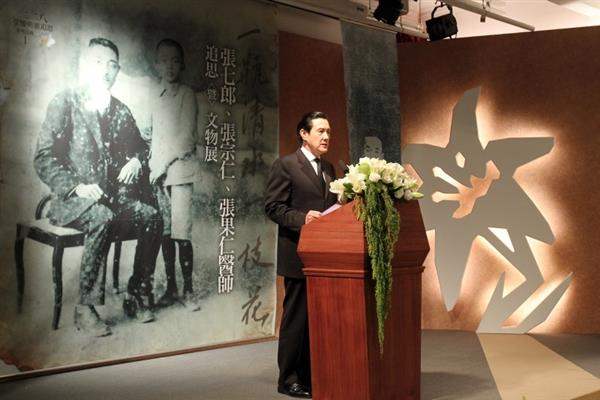News & activities
 News releases
News releases
President Ma Ying-jeou attended a memorial service on the morning of April 4 at the National 228 Memorial Museum for Chang Chi-lang and his sons Chang Tsung-jen and Chang Kuo-jen, all of whom were victims of the 228 Incident in 1947. The president, on behalf of the government, reiterated his deepest apologies to the families of the victims.
The president said that the 228 Incident was the most tragic and important event in Taiwan's modern history. The incident has affected Taiwan for over 60 years, he remarked, adding that the executions of Chang Chi-lang and his two sons were the most tragic and unjust of the 228 Incident.
President Ma remarked that Chang Chi-lang was a deeply kind physician who had opened a hospital in eastern Taiwan’s Hualien County to provide modern medical treatment and services in an area that at the time severely lacked such resources. Chang realized the importance of education and established an agricultural school in Fong-lin Township to provide the local children with educational opportunities. Chang, the president commented, was an intellectual of impeccable integrity. During the Japanese colonial era (1895-1945), Chang adamantly refused to wear Japanese-style clothing, and was a quintessential man of letters who enjoyed great respect in the community. After Taiwan's retrocession to the ROC, Chang was elected to the county council in Hualien, where he soon was named speaker, and then in 1946 was elected as one of Taiwan's 18 representatives to the National Assembly in Nanjing, where he took part in the drafting of the ROC Constitution. Chang's eldest son Chang Tsung-jen and third son Chang Kuo-jen were both doctors who early in their careers practiced medicine in mainland China's northeast region. After Taiwan's retrocession, the two sons were instructed by their father to come back to Taiwan to offer medical service for the local community in Hualien.
President Ma stressed that this incident impressed on him just what a serious and irreversible mistake the government made in 1947. He recalled that six years ago he visited Fong-lin to pay his respects to Chang Chi-lang, Chang Tsung-jen, and Chang Kuo-jen at tablets erected in their honor. He said that anyone who has a trace of humanity should be able to sense what their family went through at the time, and that he believes that everyone will feel bad about what transpired and offer their deepest apologies. The president remarked that he has been concerned about the 228 Incident over the past nearly two decades and has apologized many times. While some people may think that these actions should be enough, he feels that he can never apologize enough when he sees what the victims and their families went through.
The president commented that the government cannot hope for forgiveness from the Chang family, but what it can do, he said, is to continually pledge to the public that this sort of incident will never take place again and that what happened will never be forgotten. The president said that we must face the facts of history and must empathize with what the families have gone through. The errors made in history perhaps can be forgiven, he said, but the lessons we learn from history can never be forgotten. This is a principle that he will always uphold, the president remarked.
Although the government has taken gradual steps to restore the good name of Chang Chi-lang, the president stated that he totally understands why Chang’s family is still highly skeptical of the government. Even though the real reason for the injustice that took place is still unclear, the president expressed his hope that the 228 Memorial Foundation and academic and research units will continue working to uncover what happened. President Ma commented that while this incident happened 64 years ago, there are no taboos, and the government will squarely face any information that comes to light. This is the least that the government can do to unveil the truth and face up to its responsibility to the victims and their families, he said.



